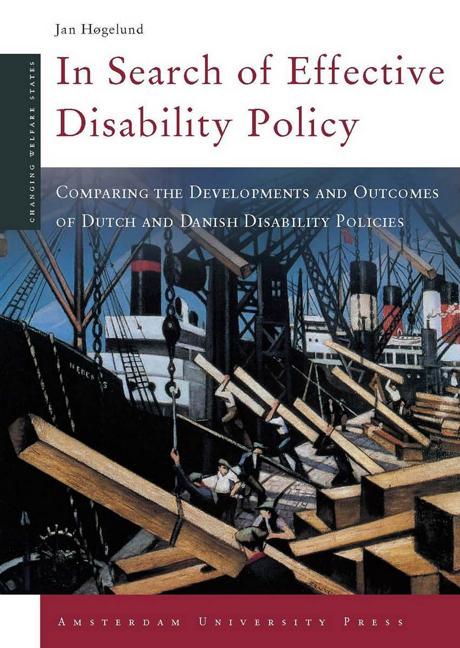 In Search of Effective Disability Policy
In Search of Effective Disability Policy Book contents
- Frontmatter
- Contents
- Acknowledgement
- 1 Disability Policies Under Pressure
- 2 The Integration of Disabled People:What Do We Know?
- 3 Bringing the Pieces Together:A Multidisciplinary Approach to Work Disability
- 4 Economic Miracles Bypassing Disabled People
- 5 Dutch Disability Reforms:Redefining Responsibilities
- 6 Danish Disability Policy:Small Steps,Big Change?
- 7 Different Routes to Integration
- 8 Different Policies – Different Outcomes
- 9 Too Much and Too Little:Employers’Responsibility in Denmark and the Netherlands
- Tables and Figures
- Notes
- References
- Index of Subjects
- Index of Names
8 - Different Policies – Different Outcomes
Published online by Cambridge University Press: 15 January 2021
- Frontmatter
- Contents
- Acknowledgement
- 1 Disability Policies Under Pressure
- 2 The Integration of Disabled People:What Do We Know?
- 3 Bringing the Pieces Together:A Multidisciplinary Approach to Work Disability
- 4 Economic Miracles Bypassing Disabled People
- 5 Dutch Disability Reforms:Redefining Responsibilities
- 6 Danish Disability Policy:Small Steps,Big Change?
- 7 Different Routes to Integration
- 8 Different Policies – Different Outcomes
- 9 Too Much and Too Little:Employers’Responsibility in Denmark and the Netherlands
- Tables and Figures
- Notes
- References
- Index of Subjects
- Index of Names
Summary
The Dutch and Danish policies differ with respect to the division of the responsibility for the integration of disabled people into the labour market. In the Netherlands this responsibility mainly rests with the individual employer, whereas in Denmark it is largely delegated to public authorities. This chapter sheds light on some of the consequences that these differences have for the extent to which disabled people are integrated into the labour market.
The Dutch regulations make it costly for employers to marginalise sicklisted workers and we should therefore expect that it will enhance the labour market integration of disabled workers. The drawback, however, might be that Dutch employers will be reluctant to employ people with health problems without prior labour market attachment because they may have an above average risk of becoming long-term sick-listed, which in turn may induce costs upon employers. Another drawback might be that the relatively good income protection during sick leave that Dutch workers enjoy might give them economic incentives to enter and stay on the disability pathway.
Whereas the Danish policy may not suffer from the same drawbacks as the Dutch policy, it is likely that it encounters other problems. The comprehensive public responsibility in terms of vocational rehabilitation is supposed to help work-disabled people to work. But it is an open-ended question if vocational rehabilitation can offset the negative consequences that may stem from the widespread dismissal of sick-listed workers. In spite of vocational rehabilitation, it is possible that these people will be unable to find ordinary employment because of their health problems.
To address these questions, I use the theoretical framework set out in Chapter 3 to identify factors that affect the return to work of long-term sick-listed workers. Within this analytical model it is then possible to disentangle some of the effects that the unique characteristics of the Dutch and Danish disability policies have for the labour market integration of workdisabled people. That is, do dismissals counteract the reintegration of longterm sick-listed workers? Does an extensive income protection reduce reintegration? Does vocational rehabilitation in terms of education help the sick-listed back to work? And equally important: do the high employer costs in the Netherlands reduce the labour market integration of partially workdisabled people without prior labour market attachment?
- Type
- Chapter
- Information
- In Search of Effective Disability PolicyComparing the Developments and Outcomes of the Dutch and Danish Disability Policies, pp. 135 - 158Publisher: Amsterdam University PressPrint publication year: 2003


